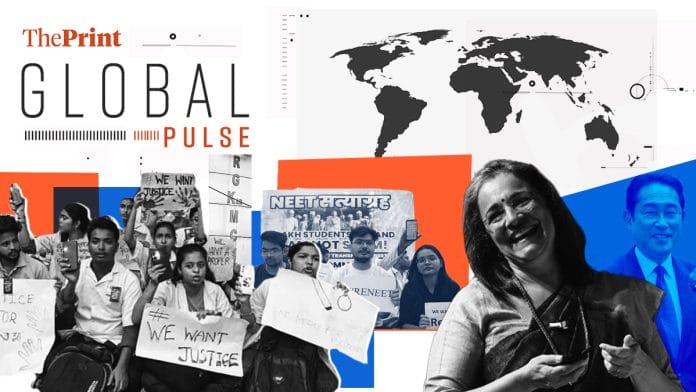New Delhi: A day before India’s Independence Day, tens of thousands of women in Kolkata and across West Bengal will participate in a ‘Reclaim the Night’ march on Wednesday in the aftermath of the rape-murder of a doctor in RG Kar hospital, reports BBC correspondent Soutik Biswas.
Recalling the 1973 Aruna Shanbaug case and Vandana Das’s murder last year, the BBC
reports that 30 percent of Indian doctors and 80 percent of nurses are women, who are “more vulnerable than their male colleagues”. The rape-murder highlights the “alarming security risks faced by the medical staff in many of India’s state-run health facilities”, Biswas writes.
Speaking to women doctors at government hospitals, Biswas claims they have become “resigned to working in conditions that compromise their security”. Mob fury over deaths and demands for immediate treatment are common at overcrowded hospitals that give unrestricted access to people and don’t have adequate security, he adds.
A Financial Times report, ‘India withdraws controversial broadcast bill after backlash‘, says that the Narendra Modi government taking back a draft bill that sought to extend regulatory oversight to online content creators after facing backlash is “a stark reflection of its reduced parliamentary mandate”. “[The government’s] legislative agenda is now something which cannot be dictated; it has to be done through trust,” Apar Gupta, an expert on technology and media law, tells FT.
The draft bill stirred concerns about a potential chilling effect on free speech and the compliance burden on online creators, writes FT South Asia bureau chief John Reed. Moreover, analysts, speaking to Reed, criticised the bill’s broad scope, which would have had a global reach. They say the bill could be brought to parliament during its winter session, and what changes are made remain to be seen.
Hindenburg Research’s latest on Adani, raising questions of conflict of interest involving SEBI chair Madhabi Buch, has become a trending topic on social media, reports BBC in ‘Why India’s market regulator is in the eye of a storm‘. The allegations, which Buch has denied, wiped $2.43bn off Adani Group’s market value at the end of trading on Monday, writes BBC journalist Meryl Sebastian, shedding light on Hindenburg’s insinuations, the defences of Buch, SEBI, and Adani Group, and what happens next.
While Hindenburg has “doubled down” on its accusations, a political slugfest is unfolding in India, with the Opposition calling for a parliamentary inquiry into SEBI’s integrity and questioning the Adani Group’s ties to the ruling party, writes Sebastian.
“India’s colossal failure to invest in education, coupled with an economic growth model that has failed to produce quality jobs, has resulted in extreme scarcity, which has intensified competition,” writes Yamini Aiyar, a visiting senior fellow at Brown University, in a Foreign Affairs report, calling the situation a toxic cocktail, leading to routine cheating.
Discussing the NEET crisis, Yamini Aiyar, a visiting senior fellow at Brown University, writes that “India’s colossal failure” to invest in education and produce quality jobs has resulted in extreme scarcity and competition — “a toxic cocktail” that leads to cheating. Highlighting that election and NEET results were both announced on 4 June, one ending in a setback to the ruling BJP and another in a scandal, Aiyar’s report in Foreign Affairs — ‘The crisis of Indian capitalism‘ — discusses “why politicians choose statist solutions over economic reforms”.
“In stark contrast with a country such as China, India has not developed a broad base of low-skilled manufacturing work. Instead, its economic growth has relied on the far smaller high-skill service sector, breaking the link between growth and mass job creation,” writes Aiyar, highlighting the problem. Behind this, she adds, lies the resistance to liberalising regulations, blaming it on not only the “obduracy of politicians” but also the “failure of capitalism in India to win the trust of the public”.
With many analysts asking the BJP to craft an industrial policy to rebalance India’s economic growth model toward job creation, Aiyar writes that perhaps the Opposition can get this process started by drafting a “shadow policy,” going where the BJP has feared to.
In his latest podcast, Financial Times’ Chris Kay discusses how alarm bells are ringing in the backdrop of India’s soaring stocks, driven by domestic investors piling into the equities market for the first time.
Kay discusses the “rags to riches” story of an Indian YouTuber, P.R. Sundar, who turned his basic investment into a $12 million fortune, to talk about the larger problem of unemployment and lack of quality jobs in India and more so for freshers entering the job industry. “And so the idea of getting rich quickly really appeals,” he says.
In this context, he warns of a speculative bubble, saying the market can go down since everything cannot keep going up forever, highlighting India’s bureaucratic nature and stock market scams.
Ukraine to advance deeper into Russia, Japan PM to step down
In the backdrop of Kyiv claiming to control 1,000 sq km of Russian territory, Moscow has claimed to down strikes on Kursk, Voronezh, Belgorod, and Nizhny Novgorod. Kyiv, however, has plans to advance deeper into Russia. For more, read the Al Jazeera’s latest on the Russia-Ukraine war.
Japanese Prime Minister Fumio Kishida will likely step down after the ruling Liberal Democratic Party elects a new leader in September. Announcing his plans, Kishida has said that the party needs a “new start”. To know more, read the BBC report.
(Edited by Madhurita Goswami)
Also read: New Hindenburg report’s ‘awkward’ timing for Adani & Bangladesh crisis hits India’s exports hard






